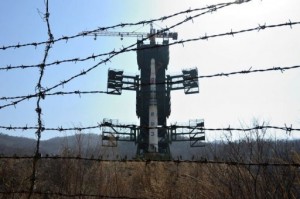Technology is politically and ideologically neutral.
It would be comforting to believe increasing levels of technology alone could solve social and political problems and make the world a better place. But history has proved that false, alas! again and again. When German scientists with their traditional leadership in chemistry invented a new gas to murder Jews more efficiently in Nazi death camp “showers”, we got new proof.
Complexities of new technology present new opportunities which may or may not be used for moral or beneficial utilitarian purposes.

We are currently in the throes of new tests, were they needed, of the phenomenon. North Korea, an unprecedented cruel and retrogressive regime, is trying to preserve its existence with technologically advanced weapons of mass destruction. With those it could continue to blackmail the world into tolerating — and even supporting its continued existence, if nothing else, by feeding a starving population.
Surely, even in their irrationality, Pyongyang grows more desperate, recognizing it is on the cusp of implosion. In a relatively small population [perhaps even less than official outside estimates of 25 million] at least 1 percent is incarcerated under conditions more than matching any horror in Nazi Germany or Soviet Russia. It seems unlikely over time mass undernourishment — a near decade of famine in the 90s may have taken as many as 3.5 million lives — would not impact on the human reservoir for the world’s fourth largest army of over a million men. [North Korean children are a head shorter than South Koreans, only one obvious manifestation of deprivation.]
But in the meantime, Pyongyang confronts the rest of the world with a huge dilemma. Soon North Korea probably will go on to test new nuclear weapons — almost a political requirement “to save face” of the new inexperienced nominal leader, Kim Jung Un, after the abysmal failure of its latest missiles test. But there is no stability for a regime that cannot feed its people while diverting resources to such extravagant technological misadventures.
Next door in China, Pyongyang’s only ally, the one-party dictatorship’s unprecedented economic progress has led to a crisis wherein corrupt leaders — masked as representing conflicting ideologies — are brawling. Having introduced digital communications, their incredibly elaborate effort to control public participation and expression broke down this month. At this writing, it is still not clear why Chinese web sites were knocked off temporarily even though official government media announced purging tens of thousands of netizens and some websites themselves.
But clearly the successful application of latest world technology has not solved the problem of how to guide a fifth of the world’s population into a rapidly changing environment. Nor has it stifled calls for a more just if not a free society. It seems unlikely Beijing’s Party leadership — scheduled for renewal this fall — will ultimately be able to put the increasingly vocal internet dissidence back in the box. Then what?
The danger for the rest of the world, of course, is these regimes — unable even with borrowed and stolen foreign technology — will be able to solve their domestic problems within the narrow politics they have chosen.
Unfortunately, North Korea holds South Korea’s cosmopolitan society hostage: Greater Seoul with a fourth of that country’s 50 million people is within range of Pyongyang’s aging artillery. Only incredible restraint by a conservative South Korean government to a series of North Korean provocations has so far prevented another war on the peninsula.
Similarly, Beijing’s rapidly growing military technological capacity increasingly becomes a potential threat as China enters a new period of complex challenges for a rapidly aging population in a depressed world economy no longer able to afford it unlimited opportunities. Chauvinist rhetoric and occasional provocative acts, also have characterized China’s military. And the once organic relationship between Party and a growing technologically advanced military no longer guarantees continued more cautious civilian dominance.
As the U.S. moves toward renewing its executive and legislative organs, it is increasingly self-evident the dangerous world in which we always live is growing even more precarious.
American technological leadership, however much eroding in a time of straitened resources, is more than ever necessary. But it will take more than technology to meet these challenges. Bold strategies, for example, sanctioning Chinese banks supporting North Korea’s economy — earlier so effective in ending Pyongyang’s currency counterfeiting in Macao — may be a necessity.
Sol W. Sanders, (solsanders@cox.net), writes the ‘Follow the Money’ column for The Washington Times on the convergence of international politics, business and economics. He is also a contributing editor for WorldTribune.com and East-Asia-Intel.com.

